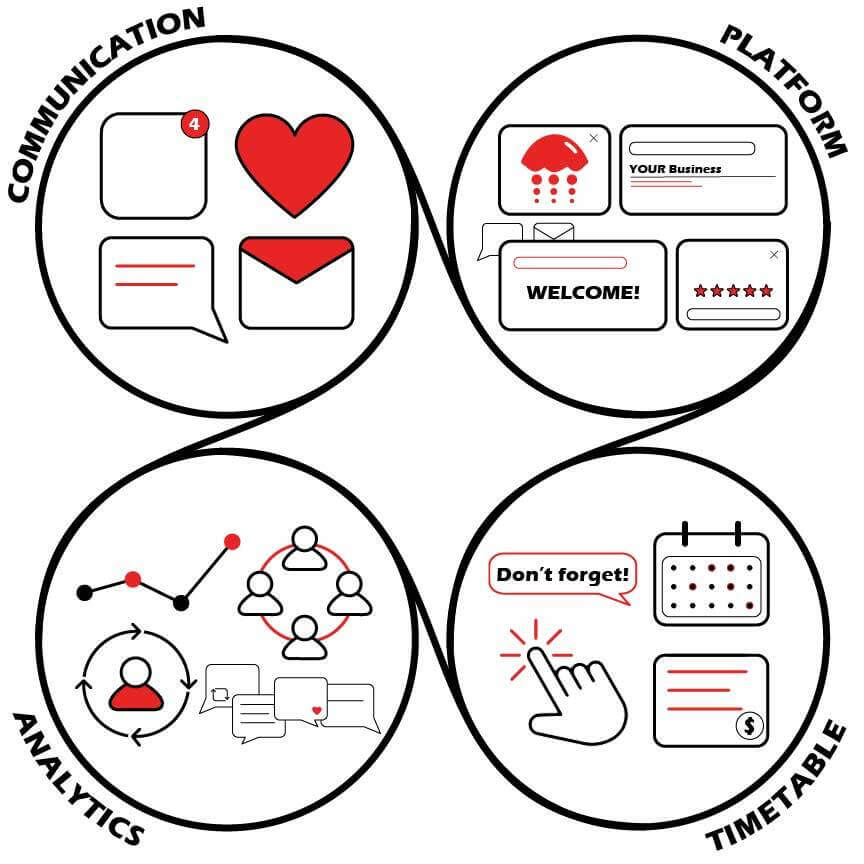What is Marketing Automation?
Marketing automation is a tool that automatically manages multifunctional marketing actions and campaigns across multiple channels. It can manage outreach, measure engagement, filter prominent leads, automate tasks, and measure the outcomes of your campaigns.
It is a must-have digital tool for the modern business. Automation can shoulder necessary but time-consuming business functions so that you can focus on creativity, connection, and tasks that require special skills. Especially if there is a small staff at your business, even one, this technology can turn your team of one into a team of twenty.
Marketing automation generally falls into four different categories: communications, platform management, timetables, and analytics.
Communications:
This can be emails, SMS messaging, automatic replies on in-app or on-site messaging, survey prompts, social media notifications, and posts. Automating these actions allows you to regularly and consistently engage with your customer base.
Keeping in contact with your customers and reaching out to potential new customers is a great way to provide opportunities for people to engage with your brand. People are much more likely to follow a link when it’s engaging and professional, but they need a message to view and a link to follow. Consistent and widespread messaging can be difficult to manage individually, so you can set up messages and posts in advance to go right to your target market.

Platform:
Whether you’re on an app, a website, or another engagement platform, you want to make sure that you have a relevant and viewable presence. Search Engine Optimization (SEO) is a way to make your digital media more relevant to people looking for things in connection with your business. Google “crawls” through data to find keys words and high-traffic that might provide viewers with relevant information, so you should be providing search engines with data that can connect users to your business.
Feedback, surveys, testimonials, and ratings are also great ways to gain traffic and credibility. Wouldn’t it be great to have something that follows up with every customer and asks for feedback and a quick review of your service? Well, surprise! You can set pop-ups to ask for feedback or request a review after every checkout, as well as dialogue boxes and easily-to-respond to prompts for feedback. However, you should use this with caution; there is a big difference between effective pop-ups and ads that make you want to avoid the business out of pure spite. Check out this article if you want to learn about the difference!
Timetable:
In a perfect world, transactions could follow a very specific and predictable format, but how often does that actually happen? Especially in freelance and service businesses where deliverables are not always the same, billing can get disorganized and fall behind.
Other financial and accounting software (like SalesForce, Expensify, Evernote, and more) can help track invoicing and payments, but automation can streamline that process to make sure things are not just documented, but also keeping you and your customers on schedule. Messaging your customers with reminders, tracking your timeline, and establishing uniform transactions can take the stress off your work life.
Automation can also send nudges, reminding customers that they have items in their cart and stock for their saved items is dwindling or sales are ending soon. Automating messages for general engagement can be a powerful tool, but sending time-sensitive updates to every customer is just not feasible for a growing business. Thankfully there are automations that you can set up in advance to analyze and respond in real time.
Analytics:
You want to make sure that you are not just blasting messages, you also want to make sure you are reviewing actionable data from your audience.
Are your viewers engaging with your content?
What methods have been most successful?
Where is your traffic coming from?
What do your customers have in common?
Analytics, metrics, and useable data can be difficult to collect and interpret. Marketing automation can do more than just output tasks, it can also react to your audience and provide you with useful insights.
Customer Relationship Management (CRM) is an organizational tool that helps organize and categorize relationships and interactions with customers and soon-to-be customers. This helps you understand what customers have in common, their contact information, and their engagement history, and track their progress.
What stage each person is at in the customer life cycle is also a valuable insight as different strategies are employed to attract new consumers versus converting current customers into loyal users and brand advocates. You want to ensure your campaign strategies are effective, so establish marketing automations to ensure you are taking advantage of that data.
Summary:
As you’ve seen marketing automation tools are a powerful tool in the online business arsenal. Preparing for success can be applied in so many different ways with this technology to make your business relevant and engaging with your audience and make you more efficient with your available resources. You should leave those repetitive and tedious tasks to prepared automation, so you can focus on what you do best!
Written by Abigail Marks







